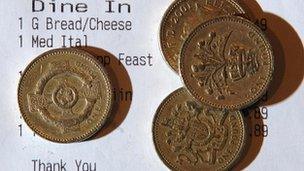'Living wage' campaign launched by young people as a way to tackle child poverty
- Published

The young people argue the current minimum wage is not enough to live on
A group of young people has called on the Welsh government to pay a "living wage" rather than the minimum wage, as a way to tackle child poverty.
The living wage is calculated by academics at £7.20 an hour, as a minimum level of pay to ensure an acceptable standard of living.
This compares to the national minimum wage for adults of £6.08 an hour.
Ministers say they are still assessing the implications of a living age in Wales.
The Scottish Parliament has already signed up to be a living wage employer.
The Step Up: A Living Wage to Live Life campaign was chosen by young people, aged 10-16, from around the UK working with Save the Children, following discussions around child poverty.
An online petition has been launched as part of the campaign.
The campaign in Wales wants the Welsh government to take a lead as a living wage employer, and encourage councils, universities and business to folow suit.
'Standard of living'
Young people from Wales, England, Scotland and Northern Ireland voiced concerns about their futures and not being able to get jobs that paid enough for them to be able to enjoy a decent standard of living.
Sophie Lacey, 16, who attends Willows High School in Cardiff said: "I think it's unfair that some people aren't earning enough money to have a good standard of living.
"I was inspired to campaign for the living wage because I am going to be looking for a job in the future and when I get one I want to be able to earn enough to pay the bills and not have to struggle to make ends meet."
Save the Children in Wales' James Pritchard said the young people had challenged the politicians to listen and keep their promises.
"It should be a real wake-up call to everyone in government to realise that the number one issue that the young people we work with has is finding a job which pays them enough to live a decent life," he said.
'Times are tough'
Pupils should be able to expect that if they work hard at school and find a job then it will pay them a living wage, he added.
"This is also about hitting child poverty. Around 60% of the children living in poverty in Wales have at least one working parent, so improving pay rates for those people will potentially make an enormous difference to the lives of the poorest children."
Mr Pritchard acknowledged that "times are tough and budgets are tight" but added that the cost to the public purse of improving pay rates for the lowest paid workers is relatively small.
Wales should not abandon its lowest paid workers, or admit defeat in the battle against child poverty, he added.
The Welsh government has said it is still assessing the implications of a living wage in Wales.
- Published25 March 2012
- Published28 February 2012